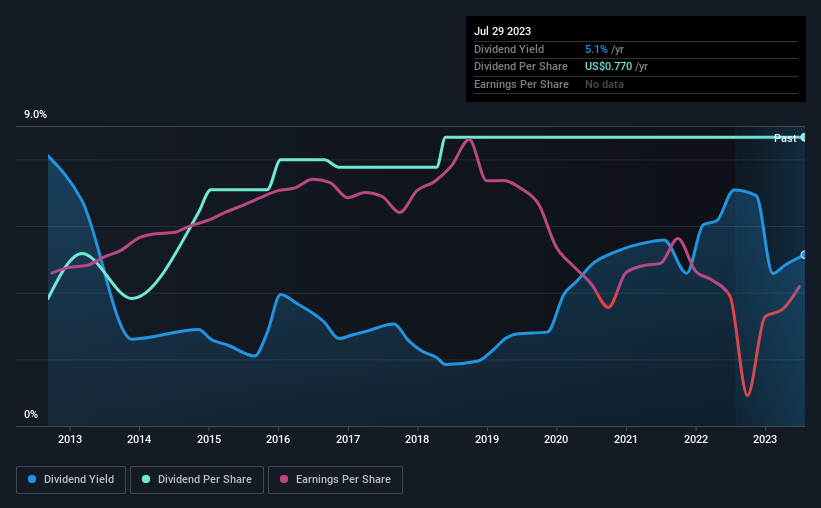We Wouldn't Be Too Quick To Buy Universal Insurance Holdings, Inc. (NYSE:UVE) Before It Goes Ex-Dividend
Universal Insurance Holdings, Inc. (NYSE:UVE) stock is about to trade ex-dividend in 4 days. The ex-dividend date is one business day before a company's record date, which is the date on which the company determines which shareholders are entitled to receive a dividend. The ex-dividend date is important because any transaction on a stock needs to have been settled before the record date in order to be eligible for a dividend. In other words, investors can purchase Universal Insurance Holdings' shares before the 3rd of August in order to be eligible for the dividend, which will be paid on the 11th of August.
The company's next dividend payment will be US$0.16 per share, on the back of last year when the company paid a total of US$0.77 to shareholders. Based on the last year's worth of payments, Universal Insurance Holdings stock has a trailing yield of around 5.1% on the current share price of $14.98. Dividends are an important source of income to many shareholders, but the health of the business is crucial to maintaining those dividends. That's why we should always check whether the dividend payments appear sustainable, and if the company is growing.
See our latest analysis for Universal Insurance Holdings
Dividends are typically paid from company earnings. If a company pays more in dividends than it earned in profit, then the dividend could be unsustainable. An unusually high payout ratio of 350% of its profit suggests something is happening other than the usual distribution of profits to shareholders.
When a company pays out a dividend that is not well covered by profits, the dividend is generally seen as more vulnerable to being cut.
Click here to see how much of its profit Universal Insurance Holdings paid out over the last 12 months.
Have Earnings And Dividends Been Growing?
Businesses with shrinking earnings are tricky from a dividend perspective. Investors love dividends, so if earnings fall and the dividend is reduced, expect a stock to be sold off heavily at the same time. Universal Insurance Holdings's earnings have collapsed faster than Wile E Coyote's schemes to trap the Road Runner; down a tremendous 43% a year over the past five years.
The main way most investors will assess a company's dividend prospects is by checking the historical rate of dividend growth. Universal Insurance Holdings has delivered an average of 8.5% per year annual increase in its dividend, based on the past 10 years of dividend payments. That's intriguing, but the combination of growing dividends despite declining earnings can typically only be achieved by paying out a larger percentage of profits. Universal Insurance Holdings is already paying out 350% of its profits, and with shrinking earnings we think it's unlikely that this dividend will grow quickly in the future.
Final Takeaway
Is Universal Insurance Holdings worth buying for its dividend? Not only are earnings per share shrinking, but Universal Insurance Holdings is paying out a disconcertingly high percentage of its profit as dividends. Generally we think dividend investors should avoid businesses in this situation, as high payout ratios and declining earnings can lead to the dividend being cut. These characteristics don't generally lead to outstanding dividend performance, and investors may not be happy with the results of owning this stock for its dividend.
Having said that, if you're looking at this stock without much concern for the dividend, you should still be familiar of the risks involved with Universal Insurance Holdings. Our analysis shows 2 warning signs for Universal Insurance Holdings and you should be aware of these before buying any shares.
Generally, we wouldn't recommend just buying the first dividend stock you see. Here's a curated list of interesting stocks that are strong dividend payers.
Have feedback on this article? Concerned about the content? Get in touch with us directly. Alternatively, email editorial-team (at) simplywallst.com.
This article by Simply Wall St is general in nature. We provide commentary based on historical data and analyst forecasts only using an unbiased methodology and our articles are not intended to be financial advice. It does not constitute a recommendation to buy or sell any stock, and does not take account of your objectives, or your financial situation. We aim to bring you long-term focused analysis driven by fundamental data. Note that our analysis may not factor in the latest price-sensitive company announcements or qualitative material. Simply Wall St has no position in any stocks mentioned.
Join A Paid User Research Session
You’ll receive a US$30 Amazon Gift card for 1 hour of your time while helping us build better investing tools for the individual investors like yourself. Sign up here

